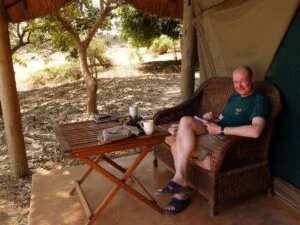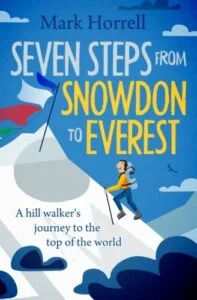We've posted before about how you can “repurpose content”, as the jargon goes, to turn a blog into a book. Today Mark Horrell takes the conversation further to explain how he uses his blog to improve his writing and build his audience as a non-fiction writer.
I became an indie author almost by accident.
I had a website that I used for posting my travel photos and diaries. When I bought my Kindle in 2011, I found out that any fool could upload an ebook to Amazon if they wanted. I reformatted all my diaries and did just that, selling them at $0.99 a pop.
I broke most rules of publishing.
Those early diaries were entirely self-edited, with plenty of clumsy sentences and typos. I never checked my stats, so for all I knew, only I had ever read them before. I had no expectations.
From Blog to Book
Much to my surprise, people started buying them and posting four- and five-star reviews.
More significantly, I had found a niche.
Even now, most mountaineering books are about epic, impossibly dangerous climbs, or disasters. An ordinary guy, writing about easy, run-of-the-mill pootles in the mountains – the sort of thing you or I could do? This was something new. Traditional publishers wouldn’t touch these stories with the pick of an ice axe, but I had discovered that readers found them refreshing. I had a market.
Some of those amateurish, self-edited diaries are still up there on Amazon. I’m sure many of you would be embarrassed by them, but I have never regretted publishing them, because they found me an audience, and the seed of a career.
From Amateur to Professional
I’m much more professional now. Last year I published my first “proper” book, Seven Steps from Snowdon to Everest – proper in the sense that it was professionally edited, and went through several drafts with beta readers. Unlike those diaries, I polished it thoroughly, until it shone like morning sunlight reflecting off a glacier.
But otherwise it was very much in the style of those early works: an ordinary guy with no particular talent pursuing a ten-year dream to reach the summit of Everest.
By then I had been blogging regularly for five years. This has enabled me to expand my audience significantly. Almost my entire audience has been acquired by just two means: discovery on Amazon and blogging. Oh, and word of mouth. Three means.
As with all writing, the key to getting an audience by blogging is discipline. In the early days I posted sporadically, whenever I thought of something interesting to write about. It took me a while to find my voice and a focus for my blog. I wrote about many things I wouldn’t consider suitable now.
Regular Habits
Now I write one post a week and publish it every Wednesday, without fail. Apart from the odd mountaineering trip (which I justify on the grounds of research) I have succeeded in posting something every week of my life for the last five years. The average post is 1,500-2,000 words in length. This feels like a good length to cover a topic in depth without taking too many liberties with my readers’ time. But the beauty of blog posts is that size doesn’t matter. If I feel I need 5000 words, I’ll write 5000 words.
It’s my blog, so I can do what I like.
Better Focus
The topics of my posts are more focused now, as well. I cover mountaineering history, and I review books and films on the subject. If I manage to get out into the mountains, I’ll post a trip report when I return.
But by far my most popular posts are my opinion pieces about commercial mountaineering on Everest. This is an emotive subject with lots of misinformation circulating in the media, so it’s easy for me to write knowledgeably and challenge popular notions.
A Two-Way Flow – Twice Over
A lot of the material on my blog finds its way into my books, and vice versa. I tried out many ideas for Seven Steps in blog posts, and repurposed several posts for the book. Conversely, many of the 60,000 words I ended up chopping from the book became blog posts.
When I came to design the cover, I was looking to do something a little bit different from the standard mountaineering book cover. I found them all a bit boring, and felt they deterred many potential readers. I did a blog post about it, and got some amazing feedback from my readers which gave me the confidence to try a new concept. It worked, and I’ve even noticed Britain’s top mountaineering book publisher adopting a similar style for a couple of their recent books. This journey to a perfect book cover became the topic of another blog post.
Endless Supply of Content
By following the right people on Facebook and Twitter (and reading a lot) I have an endless supply of material for new blog posts. Many authors misunderstand Twitter, believing it to be a marketing platform. This can become a by-product, but only once you’ve understood that it’s true power is precisely the opposite. Twitter is all about who you follow. By following interesting and knowledgeable people in your niche, you keep up to date and become more of an expert in your topic area. I’ve found lots of interesting stuff to write about this way, and if I write about it with a new angle, people start listening to me as well.
Where Next?
I frequently get asked to talk about my travels and writing, but I’ve yet to accept any of these invitations. When they’re not writing, most travel writers do a lot of public speaking. For some it’s their principal source of income, with book sales coming a distant second, but it’s never really appealed to me. Although I’m sure it would help to raise my profile, I’m of the belief that it’s not essential. An evening spent addressing an audience is an evening I could spend writing a blog post, honing my craft and acquiring readers.
The best way to improve as a writer is to write, and blogging enables me to do this in bite-sized chunks.
I’m not yet a full-time professional writer, but with every book and blog post I get more readers and climb one step closer. I don’t earn enough from writing to quit the day job yet, but I do earn enough to pay for my expeditions, which is nice. I remain hopeful that with a couple more “proper” books and many more blog posts behind me, it will be possible.
OVER TO YOU Do your blog and your book feel like a double act? Do you have top tips of your own to add to Mark's advice? Join the conversation!
#Bloggers - wondering how to turn your blog into a book?And vice versa! - #toptips from @MarkHorrell Share on XRELATED POST Here's a post from our archives about turning your blog into a book:









Blogging is the first step towards writing our thoughts and imagination. And converting it into book is the most trending nowdays.
You said right that a person blogging has initiated the first step towards self publishing.
Hi Mark
Your self-publishing experience will help me a lot in self- publishing my own book. After reading your journey it has given me more clarity on how can I turn my blog post into a book more easily and efficiently.
Now have an idea of all the challenges and obstacles that i will encounter while working on it and will take all the necessary precautions needed.
Thanks
Regaurds
[…] Writing: How Starting A Blog Turned Me into a Self-published Author […]
[…] How Starting A Blog Turned Me into a Self-published Author by Mark Horrell […]
[…] Writing: How Starting A Blog Turned Me into a Self-published Author […]
Thanks Mark for writing such an inspirational blog. Really Writing is an art which few can possess but the way you have turned yourself as an author is really inspiring.Blog writing is very effective in reaching out to the audience and it proves essential to be a good writer in future.Unique writing engages more visitors to view your blog. The experience you have discussed is really great
[…] post first appeared as How Starting a Blog Turned Me into a Self-Published Author on the Self Publishing Advice Center blog, run by the Alliance of Independent Authors […]
Thanks, Lorna. Glad you liked it. I agree with you that a blog is a great practice ground. I have no doubt that it improves my books and helps me to developer as a writer.
Hi Mark. Great post. I blog every Monday and tend to work to a pattern across the month (general; interview; opinion; travel) although I change it around every year or so. I write both fiction and non-fiction (business skills for authors) and repurposed posts on the non-fiction into a series of ebooks. I was upfront in the books about the source of the material, but got a couple of adverse reviews about the whole repurposing thing. Do you ever get that?
Hi Elizabeth, I’ve never had that, though in my case we’re talking about a single book, where any content I’ve taken from a blog post has been substantially reworked and used in a different context. It would be somewhat churlish for a reader to complain, given that they are getting a considerable quantity of original content too, worked into a story.
More often it works the other way round. I might take a paragraph or two from a diary that I’ve sold on Amazon, and work it into a post that I’m offering for free on my blog. But again, the blog post would include original content too, so I would be surprised if anyone complained, and wouldn’t take it too seriously if they did.
I love this story, Mark! Of course, I’m the one who blogged a book on how to blog a book! LOL. But you’re doing exactly what I talk about. I do recommend publishing shorter posts more often, but if you already have an audience, like you do, and are ranked well in Google, longer posts published once a week work!
I’d love to interview you for my blog…I’ll be in touch.
Hi Nina, Thanks for the message. I’ve just been looking at your blog, and read the post about blog length. Although I do write the occasional 400-worder, these posts are super light, more like announcements. They don’t get anything like the engagement of my longer posts, and I’m sure I would disappoint my readers if I did this too often. I’m not sure I’d describe what I do as “blogging a book” though – I would understand this to mean serialising a book in the tradition of Dickens. My posts are more like short essays, each on a standalone topic. I’m happy to be interviewed, if you think I would be relevant though, and thank you for asking.
I find my blog and other social media platforms hugely helpful in terms of connecting with my audience and increasing sales, I also like to test ideas in blog posts too.
I don’t get out there in front of my audiences that often but when I do, I love to hear feedback: their stories, what they enjoyed about the books and their questions too – I think it helps to make each book better.
Loved this post and it really encapsulates just what a blog can help a writer achieve.
Thanks, Lorna. Glad you liked it. I agree with you that a blog is a great practice ground. I have no doubt that it improves my books and helps me to developer as a writer.